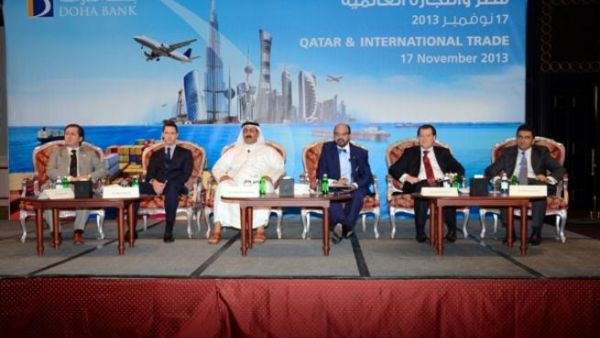Doha Bank hosts “Qatar and International Trade” Knowledge-sharing session with international guest speakers

Doha Bank, the leading private-sector commercial bank in the State of Qatar, hosted a knowledge-sharing session featuring leading international speakers.
The summit was held at the Ritz-Carlton Doha on 17th November 2013 and commenced with an introductory address by Doha Bank Group CEO, Dr. R. Seetharaman. Other presenters on the night included Mr. Yousef Jeham Al-Kuwari, Executive Director of Marketing & Sales at Muntajat; Mahan Bolourchi Director of Risk Management, Information and Claims at Euler Hermes GCC and Middle East ; Philipp Lemmerz, Head of the Public Policy Team at PWC Germany; Yasar Yilmaz, Regional Head of Financial Services, SAP MENA; and Rohan Westcott, a Managing Director responsible for Energy Trade Solutions of the Fixed Income, Currencies and Commodities business at Macquarie Bank.
The presentations on the day covered Markets and Trade Flows, the role of Export Credit Agencies (ECAs), facultative technology, Sources of Funds & Risks in GCC Trade Finance, and Structured Trade Finance.
One of the experts Philipp Lemmerz, Head of the Public Policy Team at PWC Germany, said: “As global trade increases and financing volumes grow, trends point towards a greater role for emerging regions. The volume of global trade finance is estimated to reach US$ 38bn by 2015, from US$ 18 bn in 2008, and having reached US$ 28.9 bn in 2011. We have seen that MENA and GCC countries are capitalizing on global trade dynamics and trade finance needs are growing in proportion. Some of the current challenges being faced by commercial banks in the region include meeting the finance needs of SMEs and trade finance customers.
Mr. Lemmerz also said structured country risk monitoring is an underestimated asset of strategic management and not enough corporates are presently monitoring these risks. He also said the trend is positive as more companies are seeking financial advisers who can help in these areas, while Banks in the region gear up to implement Basel III recommendations and other strict policies. This will help control leverage ratios and allow banks to extend their trade finance services by reevaluating their position within the market as a provider of trade finance.
Mahan Bolourchi Director of Risk Management, Information and Claims at Euler Hermes GCC and Middle East, said: “The GCC is a low risk area due to political and fiscal stability, low costs, the strong vision of the ruling families and government, which support economic growth in the region. If you look at the GCC alone, all the major growth sectors are positive. The top ten GCC banks were among the fastest growing globally, recording 16% growth in June 2013 to register total assets of $743 bn. Petrochemicals capacity in the region is forecast to reach 191.2 million tons by 2020 – another major export sector. And consumer spending will reach US$106 billion in the next five years, with food remaining the largest segment.”
Euler Hermes is a global credit insurance leader with 34% market share. At the summit, Dr. Seetharaman and Mr. Bolourchi also confirmed that Euler Hermes will be supporting Doha Bank’s clients with ready solutions for receivables protection, custom made solutions for companies with larger turnover, preferential pricing for all clients under Doha Bank, as well as the latest market updates through Euler Hermes risk bulletins and sector or regional reports. There is also a plan to initiate annual risk workshops on related business sectors.
Doha Bank Group CEO, Dr. R. Seetharaman said: “Qatar is a beacon of sustainable development in the region and the fundamentals of Qatar’s steady growth are have been prudent fiscal management, effective risk management and ambitious development goals. These factors are also essential to ensuring protracted sustainability in trade relationships with countries around the world.”
Dr. Seetharaman said: “Doha Bank works closely with government entities and corporations to promote bilateral trade across multiple markets and the objective of these knowledge-sharing sessions is to demonstrate to our clients and partners that we are always thinking beyond the proverbial square. Doha Bank’s aim in every case is to support development with key advisory services that benefit both sides as well as financial services that help achieve their desired objectives. These include sharing advanced research conducted by the Bank as well as deploying a tailored suite of trade finance and corporate finance solutions. One of the most important aspects of such client relationships is also the ability to bring leaders in various sectors together as we have today to explore ways to maximize the value of every venture or project and provide insight-based development criteria. Today’s speakers will focus on financial management and due diligence in the delivery of financial services to clients with an appetite for growth.”
Dr. Seetharaman outlined some recent trade data in his address: “According to preliminary figures of the value of exports, re-exports and imports for September 2013, official data suggests that Qatar’s hydrocarbon-based exports were responsible for the international trade balance of goods showing a surplus of QR 32.9 billion, representing an increase of QR 0.3 billion (0.9%) compared to September 2012. Countries such as Japan with 28%, South Korea with 18% and India with 9% were the top export destinations for Qatar. South Korea with 13% of total imports, followed by the USA and China with a share of 10% each, were the largest import trade partners to Qatar at the end of the same period.”
Qatar is building infrastructure capacity and corporate trade and service platforms to achieve Qatar Vision 2030. So, in addition to the countries mentioned, a large number of European, Middle Eastern and Asian nations and their leading corporate brands are looking to participate in Qatar’s development. Conversely, Qatari brands too are seeking to branch out and diversify their asset bases. These entities will all need to work with specialized partners and financial advisers such as Doha Bank to achieve peak success. Fortunately, Doha Bank has pursued a strategic growth trajectory with representative offices established in many of these countries.”
Doha Bank operates a Representative Office network that extends across the UK, Germany, Turkey, Singapore, China, Hong Kong, South Korea, Japan and Australia, with full branches in the UAE and Kuwait.
Dr. Seetharaman said: “This represents tremendous bilateral trade opportunities in key sectors. Qatar’s focus on infrastructure development, education, sport and major service sectors has positioned the country as an important global destination for experts in these fields.”
Background Information
Doha Bank
Inaugurated in 1979, Doha Bank provides domestic and international banking services for individuals, commercial, corporate and institutional clients through four business groups – Wholesale Banking, Retail Banking, International Banking and Treasury & Investments.
Doha Bank has established overseas branches in Kuwait, Dubai (UAE), Abu Dhabi (UAE), Mumbai, Chennai and Kochi (India) as well as representative offices in Japan, China, Singapore, Hong Kong, South Africa, South Korea, Australia, Turkey, the United Kingdom, Canada, Germany, Bangladesh, Sri Lanka and Nepal.






